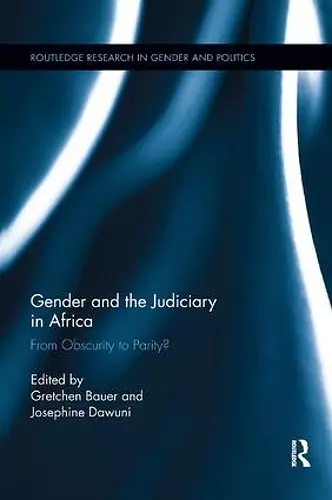Gender and the Judiciary in Africa
From Obscurity to Parity?
Gretchen Bauer editor Josephine Dawuni editor
Format:Paperback
Publisher:Taylor & Francis Inc
Published:14th Aug '18
Currently unavailable, and unfortunately no date known when it will be back
This paperback is available in another edition too:
- Hardback£160.00(9781138856493)

Between 2000 and 2015, women ascended to the top of judiciaries across Africa, most notably as chief justices of supreme courts in common law countries like Ghana, Nigeria, Sierra Leone, Gambia, Malawi, Lesotho and Zambia, but also as presidents of constitutional courts in civil law countries such as Benin, Burundi, Gabon, Niger and Senegal. Most of these appointments was a "first" in terms of the gender of the chief justice. At the same time, women are being appointed in record numbers as magistrates, judges and justices across the continent. While women’s increasing numbers and roles in African executives and legislatures have been addressed in a burgeoning scholarly literature, very little work has focused on women in judiciaries. This book addresses the important issue of the increasing numbers and varied roles of women judges and justices, as judiciaries evolve across the continent.
Scholars of law, gender politics and African politics provide overviews of recent developments in gender and the judiciary in nine African countries that represent north, east, southern and west Africa as well as a range of colonial experiences, postcolonial trajectories and legal systems, including mixes of common, civil, customary, or sharia law. In the process, each chapter seeks to address the following questions:
- What has been the historical experience of the judicial system in a given country, from before colonialism until the present?
- What is the current court structure and where are the women judges, justices, magistrates and other women located?
- What are the selection or appointment processes for joining the bench and in what ways may these help or hinder women to gain access to the courts as judges and justices?
- Once they become judges, do women on the bench promote the rights of women through their judicial powers?
- What are the challenges and obstacles facing women judges and justices in Africa?
Timely and relevant in this era in which governmental accountability and transparency are essential to the consolidation of democracy in Africa and when women are accessing significant leadership positions across the continent, this book considers the substantive and symbolic representation of women’s interests by women judges and the wider implications of their presence for changing institutional norms and advancing the rule of law and human rights.
"At last, African women judges receive the careful scholarly attention they deserve. This work underscores the centrality of the third branch of government in democratization. The authors' careful following of a common protocol allows both valuable comparisons as well as solid introductions for the country specialist and novice alike. While the authors review no simple answers to the puzzle of significant country-to-country variation, happily, they analyze how to increase women's representation rather than replaying tired essentialist arguments about difference. Perhaps African feminists will inspire the rest of the world to demand a diverse and representative judiciary? A must read for anyone interested in comparative politics, African politics, women and politics, or judicial politics."—Sally J. Kenney, Newcomb College
'At last, African women judges receive the careful scholarly attention they deserve. This work underscores the centrality of the third branch of government in democratization. The authors' careful following of a common protocol allows both valuable comparisons as well as solid introductions for the country specialist and novice alike. While the authors review no simple answers to the puzzle of significant country-to-country variation, happily, they analyze how to increase women's representation rather than replaying tired essentialist arguments about difference. Perhaps African feminists will inspire the rest of the world to demand a diverse and representative judiciary? A must read for anyone interested in comparative politics, African politics, women and politics, or judicial politics.'—Sally J. Kenney, Newcomb College, USA
'This volume offers a fascinating and timely look at the changing role and status of women in Africa’s judicial systems. Covering a large and diverse collection of countries, the chapters provide deep and sophisticated analyses of the factors shaping patterns of gender representation in judiciaries, the legal, institutional and societal impacts of greater representation for women, and the ongoing challenges facing that project. The book will be of interest to those concerned with comparative judicial development, gender politics, and patterns of change and continuity in African politics and society.'—Peter VonDoepp, University of Vermont, USA
ISBN: 9780815370550
Dimensions: unknown
Weight: 299g
216 pages